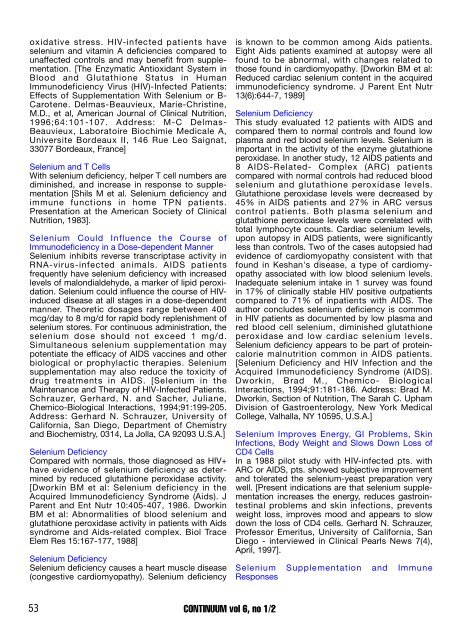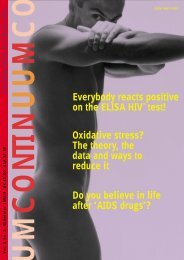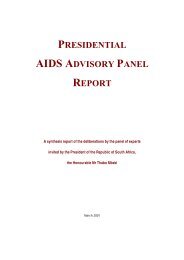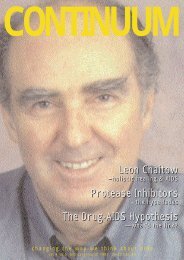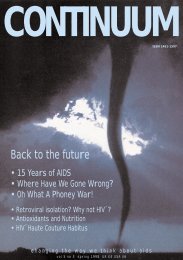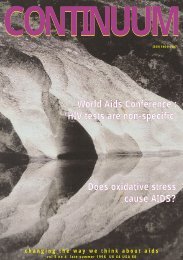AIDS post-HIV : beat of a different drummer - AltHeal
AIDS post-HIV : beat of a different drummer - AltHeal
AIDS post-HIV : beat of a different drummer - AltHeal
You also want an ePaper? Increase the reach of your titles
YUMPU automatically turns print PDFs into web optimized ePapers that Google loves.
oxidative stress. <strong>HIV</strong>-infected patients have<br />
selenium and vitamin A deficiencies compared to<br />
u n a ffected controls and may benefit from supplementation.<br />
[The Enzymatic Antioxidant System in<br />
Blood and Glutathione Status in Human<br />
Immunodeficiency Virus (<strong>HIV</strong>)-Infected Patients:<br />
E ffects <strong>of</strong> Supplementation With Selenium or B-<br />
C a rotene. Delmas-Beauvieux, Marie-Christine,<br />
M.D., et al, American Journal <strong>of</strong> Clinical Nutrition,<br />
1996;64:101-107. Address: M-C Delmas-<br />
Beauvieux, Laboratoire Biochimie Medicale A,<br />
Universite Bordeaux II, 146 Rue Leo Saignat,<br />
33077 Bordeaux, France]<br />
Selenium and T Cells<br />
With selenium deficiency, helper T cell numbers are<br />
diminished, and increase in response to supplementation<br />
[Shils M et al. Selenium deficiency and<br />
immune functions in home TPN patients.<br />
P resentation at the American Society <strong>of</strong> Clinical<br />
Nutrition, 1983].<br />
Selenium Could Influence the Course <strong>of</strong><br />
Immunodeficiency in a Dose-dependent Manner<br />
Selenium inhibits reverse transcriptase activity in<br />
RNA-virus-infected animals. <strong>AIDS</strong> patients<br />
frequently have selenium deficiency with increased<br />
levels <strong>of</strong> malondialdehyde, a marker <strong>of</strong> lipid peroxidation.<br />
Selenium could influence the course <strong>of</strong> <strong>HIV</strong>induced<br />
disease at all stages in a dose-dependent<br />
m a n n e r. Theoretic dosages range between 400<br />
mcg/day to 8 mg/d for rapid body replenishment <strong>of</strong><br />
selenium stores. For continuous administration, the<br />
selenium dose should not exceed 1 mg/d.<br />
Simultaneous selenium supplementation may<br />
potentiate the efficacy <strong>of</strong> <strong>AIDS</strong> vaccines and other<br />
biological or prophylactic therapies. Selenium<br />
supplementation may also reduce the toxicity <strong>of</strong><br />
drug treatments in <strong>AIDS</strong>. [Selenium in the<br />
Maintenance and Therapy <strong>of</strong> <strong>HIV</strong>-Infected Patients.<br />
S c h r a u z e r, Gerhard, N. and Sacher, Juliane,<br />
Chemico-Biological Interactions, 1994;91:199-205.<br />
A d d ress: Gerhard N. Schrauzer, University <strong>of</strong><br />
C a l i f o rnia, San Diego, Department <strong>of</strong> Chemistry<br />
and Biochemistry, 0314, La Jolla, CA 92093 U.S.A.]<br />
Selenium Deficiency<br />
Compared with normals, those diagnosed as <strong>HIV</strong>+<br />
have evidence <strong>of</strong> selenium deficiency as determined<br />
by reduced glutathione peroxidase activity.<br />
[Dworkin BM et al: Selenium deficiency in the<br />
A c q u i red Immunodeficiency Syndrome (Aids). J<br />
P a rent and Ent Nutr 10:405-407, 1986. Dworkin<br />
BM et al: Abnormalities <strong>of</strong> blood selenium and<br />
glutathione peroxidase activity in patients with Aids<br />
s y n d rome and Aids-related complex. Biol Tr a c e<br />
Elem Res 15:167-177, 1988]<br />
Selenium Deficiency<br />
Selenium deficiency causes a heart muscle disease<br />
(congestive cardiomyopathy). Selenium deficiency<br />
is known to be common among Aids patients.<br />
Eight Aids patients examined at autopsy were all<br />
found to be abnormal, with changes related to<br />
those found in cardiomyopathy. [Dworkin BM et al:<br />
Reduced cardiac selenium content in the acquired<br />
immunodeficiency syndrome. J Parent Ent Nutr<br />
13(6):644-7, 1989]<br />
Selenium Deficiency<br />
This study evaluated 12 patients with <strong>AIDS</strong> and<br />
compared them to normal controls and found low<br />
plasma and red blood selenium levels. Selenium is<br />
important in the activity <strong>of</strong> the enzyme glutathione<br />
peroxidase. In another study, 12 <strong>AIDS</strong> patients and<br />
8 <strong>AIDS</strong>-Related- Complex (ARC) patients<br />
compared with normal controls had reduced blood<br />
selenium and glutathione peroxidase levels.<br />
Glutathione peroxidase levels were decreased by<br />
45% in <strong>AIDS</strong> patients and 27% in ARC versus<br />
c o n t rol patients. Both plasma selenium and<br />
glutathione peroxidase levels were correlated with<br />
total lymphocyte counts. Cardiac selenium levels,<br />
upon autopsy in <strong>AIDS</strong> patients, were significantly<br />
less than controls. Two <strong>of</strong> the cases autopsied had<br />
evidence <strong>of</strong> cardiomyopathy consistent with that<br />
found in Keshan's disease, a type <strong>of</strong> card i o m y-<br />
opathy associated with low blood selenium levels.<br />
Inadequate selenium intake in 1 survey was found<br />
in 17% <strong>of</strong> clinically stable <strong>HIV</strong> positive outpatients<br />
c o m p a red to 71% <strong>of</strong> inpatients with <strong>AIDS</strong>. The<br />
author concludes selenium deficiency is common<br />
in <strong>HIV</strong> patients as documented by low plasma and<br />
red blood cell selenium, diminished glutathione<br />
p e roxidase and low cardiac selenium levels.<br />
Selenium deficiency appears to be part <strong>of</strong> proteincalorie<br />
malnutrition common in <strong>AIDS</strong> patients.<br />
[Selenium Deficiency and <strong>HIV</strong> Infection and the<br />
A c q u i red Immunodeficiency Syndrome (<strong>AIDS</strong>).<br />
Dworkin, Brad M., Chemico- Biological<br />
Interactions, 1994;91:181-186. Address: Brad M.<br />
Dworkin, Section <strong>of</strong> Nutrition, The Sarah C. Upham<br />
Division <strong>of</strong> Gastro e n t e ro l o g y, New York Medical<br />
College, Valhalla, NY 10595, U.S.A.]<br />
Selenium Improves Energ y, GI Problems, Skin<br />
Infections, Body Weight and Slows Down Loss <strong>of</strong><br />
CD4 Cells<br />
In a 1988 pilot study with <strong>HIV</strong>-infected pts. with<br />
ARC or <strong>AIDS</strong>, pts. showed subjective improvement<br />
and tolerated the selenium-yeast preparation very<br />
well. [Present indications are that selenium supplementation<br />
increases the energ y, reduces gastro i n-<br />
testinal problems and skin infections, pre v e n t s<br />
weight loss, improves mood and appears to slow<br />
down the loss <strong>of</strong> CD4 cells. Gerhard N. Schrauzer,<br />
P r<strong>of</strong>essor Emeritus, University <strong>of</strong> California, San<br />
Diego - interviewed in Clinical Pearls News 7(4),<br />
April, 1997].<br />
Selenium Supplementation and Immune<br />
Responses<br />
53<br />
CONTINUUM vol 6, no 1/2


